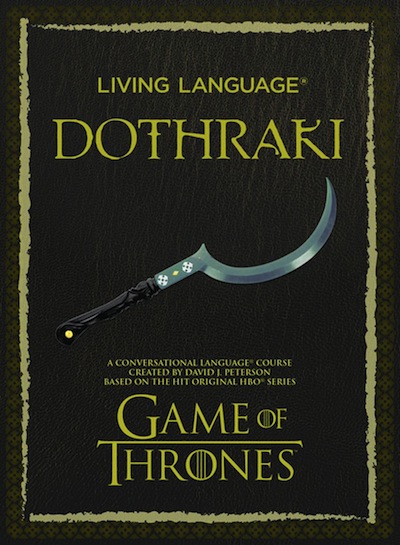5 Sinister Fictional Languages Best Kept That Way
 Need an extra shot of realism in your carefully constructed world? Time to invent a language! Authors have been creating fictional languages for decades, making it much more exciting when characters start screaming at each other. Some of these fictional languages are simple substitutes for naughty words, but others have entire vocabularies you can memorize and speak fluently. Once you start digging into a constructed language, you pull a little piece of that fictional realm out into the real world—but with the sinister constructed languages below, that might not be such a good idea.
Need an extra shot of realism in your carefully constructed world? Time to invent a language! Authors have been creating fictional languages for decades, making it much more exciting when characters start screaming at each other. Some of these fictional languages are simple substitutes for naughty words, but others have entire vocabularies you can memorize and speak fluently. Once you start digging into a constructed language, you pull a little piece of that fictional realm out into the real world—but with the sinister constructed languages below, that might not be such a good idea.
Aklo
First used in 1899, this fictional language is said to have mystical powers. As in, real world mystical powers, the kind that can sneak into your kitchen at night and replace all your coffee with decaf. Aklo was first mentioned by Arthur Machen in The White People, a fantasy horror short story that is perfectly sinister in its own right. Since then, several authors have used Aklo in their own tales, including H. P. Lovecraft. The thing about Aklo is that the writers who use it are purposefully vague about its construction and vocabulary. You know, just in case some hapless reader accidentally summons a world-devouring demon of destruction.
High Valyrian
A Song of Ice and Fire author George R. R. Martin professed he wasn’t much of a linguist, but that didn’t stop him from seeding several unique languages throughout his fantasy series. High Valyrian is sort of like Westeros’ version of Latin. No one speaks it when they’re out buying groceries or walking the dog; it’s reserved for those moments when you really need to drive a point home. The most bone-chilling phrase in the books is valar morghulis, which translates to “all men must die.” (It’s the warm and fuzzy phrase Arya Stark says when she recites her list of people she wants to kill.) Valar morghulis is usually answered with valar dohaeris, or “all men must serve.” One reminds you that death is inevitable, the other enforces the fact that the only reason you’re alive is to serve death. Have a nice day!
Nadsat
Reading Anthony Burgess’ A Clockwork Orange is a lot like paging through a creepy dictionary melded with a great novel. Its teen protagonists favor a pseudo-language called Nadsat, a loose collection of words and phrases that allow them to talk in code about all the terrible things they do. It isn’t a complete language—more like glorified slang—but it has a profound impact on how you experience the story. At first, reading about rivers of red, red kroovy pouring out of a flesh wound separates you from the horror with a wall of linguistics. Kroovy doesn’t sound so bad, right? Once you look the word up, realize it means blood, see it again and recognize it, your brain is instantly dropped cortex-first into a violent dystopian world. Not even linguistic ignorance can save you now.
Dothraki
Another product of A Song of Ice and Fire, the Dothraki tongue isn’t necessarily evil in its own right. If you happen to hear it being spoken, though, you know something bad is about to go down. The Dothraki people are warlike nomads who wander the steppes and deserts raiding and pillaging whoever and whatever happens to be in the way. They fight, they insult, and they do both with almost no provocation. Not exactly the kind of folks you’d meet at the opera. Just like High Valyrian, the Dothraki language only exists as a few words in the original novels. When the television show took off, a linguist swooped in and created a whole vocabulary for the actors to use. Now, Dothraki contains around 3,100 words—enough that you can learn to speak it, thanks to Living Language Dothraki, a language course that even includes a pronunciation CD. The most recognizable of which is khaleesi, which means “wife of a ruler,” a word so popular that in the last few years nearly 200 people named their daughters Khaleesi. That’s kind of sweet, but let’s wait and see what bullies turn it into when they need an easy insult on the playground.
The Dark Tongue of Mordor
The Dark Tongue of Mordor, also known as The Black Speech, is one of the least complete constructed languages in The Lord of the Rings. Don’t worry, there’s a very good reason for that: J.R.R. Tolkien found it utterly unpleasant to work with. Think about that for a second: the Dark Tongue is so malevolent that even its creator thought it was a little too powerful. Apart from Sauron and his servants, no one in Middle Earth speaks it, as they’re afraid it’ll draw attention from Mordor. But that avoidance goes two ways. Elves, who are basically the embodiment of all that is good and pure, are fond of the letter E. The Dark Tongue, therefore, doesn’t use that letter, ever. Relatedly, what do photographers say when they want you to smile? Cheese! That E sound in the middle naturally produces a smile. Unsurprising that the Dark Tongue ignores it entirely.
What fictional language would you study?